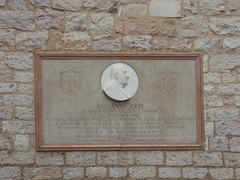Pope John XXIII
Commemorated on 1 plaque
Giovanni xxiii su questo eletto colle del paradiso" il 4 ottobre 1962 ascendeva pellegrino apostolico a venerare il sepolcro di san francesco e impetrarne l'intercessione sul concilio ecumenico vaticano 11 da questa patriarcale basilica richiamava ad esempio e conforto la mirabile vita del poverello serafico ad assisi all'italia al mondo benedicendo i frati minori conventuali del sacro convento a perenne memoria posero
English translation: John XXIII on this chosen hill of paradise” October 4, 1962 Apostolic pilgrim ascended to venerate the tomb of Saint Francis and plead his intercession on the 11th Vatican Ecumenical Council, from this patriarchal Basilica he recalled, for example and comfort, the admirable life of the poor seraphic In Assisi to Italy to the world blessing The Conventual Friars Minor of the Sacred Convent in Perennial Memory Posero [AWS Translate]
Chiesa inferiore di San Francesco - Piazza Inferiore di S. Francesco, Assisi, Italy where they was


